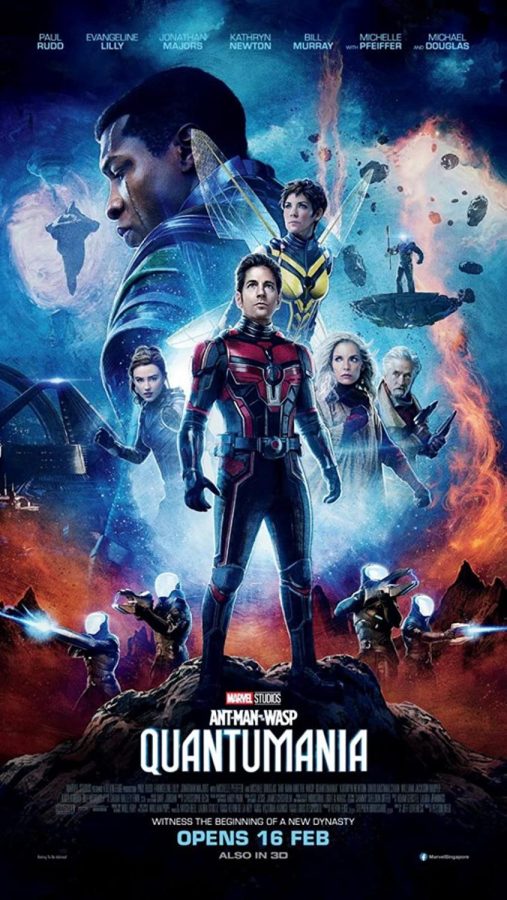“Ant-Man and the Wasp: Quantumania” is yet another miss in a recent slump of movies from the Marvel Cinematic Universe. Directed by Peyton Reed, the movie features Ant-Man, the Wasp and the rest of the Pym/Lang family on an adventure through the Quantum Realm.
The first project of the MCU’s phase five, Quantumania serves the purpose of laying down the groundwork for the future of the franchise. Setting up the next Avengers movie, “Avengers: Kang Dynasty,” the movie introduces one of Marvel comics’ highest profile villains with “Kang the Conqueror,” portrayed by Jonathan Majors.
Act one of the movie starts out strong as it features Scott Lang after the events of Avengers: Endgame. Cassie Lang, Scott’s daughter, a promising character for the future of the MCU is re-introduced. She is likely part of Marvel’s ongoing efforts to involve more characters from the “Young Avengers” storyline. The family dynamics between the Langs and Pyms feel extremely heartwarming, unfortunately a very little amount of time is spent exploring these dynamics as the movie jumps into the action a little too fast.
On paper, the concept of a movie focused entirely on the exploration of the Quantum Realm seems fascinating. Before this film, the Quantum Realm was mostly a mystery to fans, usually only used to explain some of the MCU’s most unexplainable concepts and impossible feats.
Aside from some truly breathtaking shots made almost entirely of CGI, the depictions of the Quantum Realm leave a lot to be desired. Almost no explanation as to how the society in the realm works and how most of the people got there is given. I ended up leaving the film with more questions about the place than questions answered.
Although this is an Ant-Man movie, a series known for its lighthearted comedy, most of the jokes in the film do not land. It leaves viewers feeling almost an awkward sense of second hand embarrassment.
The script feels undercooked, like it was never proofread before it was greenlit. Paul Rudd and Evangeline Lilly remain solid in their performances as Ant-Man and the Wasp, while Jonathan Majors particularly stands out despite being given an almost impossible script to work with.
The most glaring issue I had with the movie was the handling of its villains, Kang the Conqueror and MODOK. Both villains have long publication histories at Marvel Comics, clashing with the Avengers many times. MODOK, an acronym for ”Mechanized Organism Designed Only For Killing,” is anything but that. He is used almost entirely for comic relief, going as far as making him switch to Ant-Man and the Wasp’s side only because “he did not want to be a d***.”
Kang the Conqueror is a similar case and, in my opinion, even more infuriatingly depicted. The film does a good job establishing Kang as being really evil at first. He is introduced as a destroyer of universes, conqueror of timelines, and a career-murderer of the entire Avengers cast. I spent most of the first half of the movie wondering, “how is the family going to possibly come out of this unscathed?”
Even though this movie continuously tries to tell us how high the stakes are, it feels exactly the opposite of that. Once the final act comes around, Kang establishes himself as a dominant force and almost untouchable, obliterating dozens of the rebels with single attacks. Once the resolution comes, the writers seemingly forget about most of Kang’s abilities he was using five minutes prior once he gets swarmed by ants, leading to a very anticlimactic end to this chapter in Kang’s story.
This feels completely undermining to the previously established idea that he has killed the Avengers multiple times, because if he has, how could he have possibly lost to Ant-Man and the Wasp? The only thing that saves Kang the Conqueror’s future in the franchise is the introduction of the Council of Kangs in the post-credit scene, as they feel threatening to the Avengers.
After a great conclusion by Black Panther: Wakanda Forever to an otherwise lackluster Phase 4 of the MCU, the pressure was on for Ant-Man and the Wasp to deliver a compelling story and set up the future for the franchise. While it accomplishes the setup, the film was extremely underwhelming and further showcases Marvel’s struggle to find its footing in a post-“Endgame” world.
Gustavo Atencio Flores can be reached at [email protected]





















Tommy • Mar 5, 2023 at 1:24 pm
Woo yeah Gustavo great article wooo
Santiago Moral • Mar 5, 2023 at 12:57 pm
Very interesting read. I agree with most of the points presented throughout, even though I personally believe that the CGI was mostly another miss. I’m interested in hearing more about other films and how could the MCU possibly bring themselves back from this series of consecutive “underperforming” or “mediocre” films, as I would sometimes refer to them.